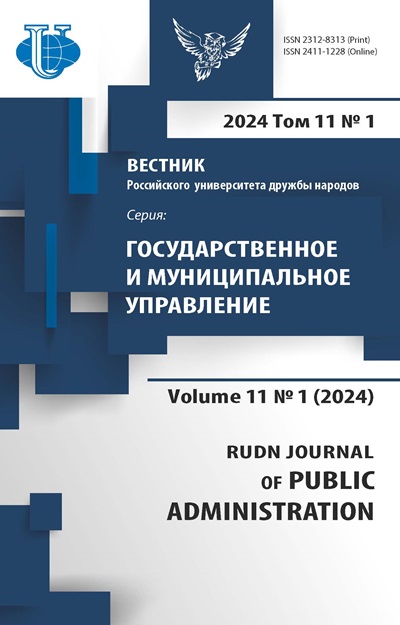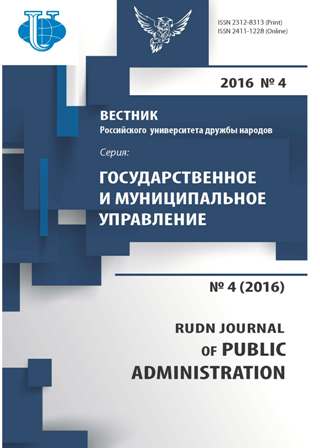RUSSIAN OFFENSIVE STRATEGY IN THE CONDITIONS OF THE MODERN INFORMATION WARFARE
- Authors: Alexeyeva E.S1
-
Affiliations:
- The Council of the Federation of the Federal Assembly of the Russian Federation
- Issue: No 4 (2016)
- Pages: 7-24
- Section: Articles
- URL: https://journals.rudn.ru/public-administration/article/view/15844
- DOI: https://doi.org/10.22363/2312-8313-2016-4-7-24
Cite item
Full Text
Abstract
Despite rather volume scientific knowledge of information warfares and methods of their maintaining, the general understanding of information warfare is still not present. And this circumstance does very difficult counteraction to this threat. According to the author, investigators of a problem need to combine efforts and to develop the uniform coordinated definition of this phenomenon in order that it was possible to state him in the legislation subsequently and to develop rules of the game in information space. After the expert community will come to consensus concerning definition of concept of information warfare, according to the author, Russia needs to initiate at the international level discussion on this matter, and then to promote emergence of concept of information warfare in international law. As soon as this concept is registered there, the countries will agree about rules of the game in an information space. Assistance to fixing in international law of accurately outlined legal definitions and standards of behavior in information space - one of the principles of the asymmetric response to external influence of stronger subjects of information antagonism. However the asymmetric answer - not the only thing that it would be possible to oppose to the existing information threats. The author, having understood an essence of information warfare, having studied it’s methods, having shown, how they work at concrete examples, gives a number of specific proposals on improvement of policy of Russia in the conditions of modern information warfare. From the author’s point of view, Russia should move from defensive to offensive strategy. But imprisoning the edge information weapons and doing accurate information strikes to weak points of the enemy, the state should use first-hand information and objective facts. This will strengthen our image and give a chance not to be defeated in the information war.
About the authors
Elena S Alexeyeva
The Council of the Federation of the Federal Assembly of the Russian Federation
Author for correspondence.
Email: milipuska@mail.ru
Moscow, Russia
References
- Aranson Je., Pratkanis Je. Jepoha propagandy: mehanizmy ubezhdenija, povsednevnoe ispol’zovanie i zloupotreblenie. SPb., 2002.
- Brusnicyn N.A. Informacionnaja vojna i bezopasnost’. M.: Vita-Press, 2001.
- Van Dejk Tjon A. Diskurs i vlast’. Reprezentacija dominirovanija v jazyke i kommunikacii. M., 2013. S.143.
- Doktrina informacionnoj bezopasnosti Rossijskoj Federacii (utv. Ukazom Prezidenta Rossijskoj Federacii ot 9 sentjabrja 2000 g.). Pravovaja baza «Konsul’tantPljus».
- Informacionnye vojny v sovremennom mire. Materialy mezhdunarodnoj konferencii. M., 2008.
- Kara-Murza S.G. Manipuljacija soznaniem. M.: Algoritm, 2013.
- Lajnbardzher P. Psihologicheskaja vojna. M.: Centrpoligraf, 2013.
- Lisichkin V.A., Shelepin L.A. Tret’ja mirovaja informacionno-psihologicheskaja vojna. M., 2000.
- Narochnickaja N. Velikie vojny HH stoletija. M.: Veche, 2010.
- Panarin A.S. Revansh istorii. Rossijskaja strategicheskaja iniciativa v XXI veke. M., Russkij mir, 2005.
- Panarin I.N. Pervaja mirovaja informacionnaja vojna. Razval SSSR. Piter, 2010.
- Poslanie Prezidenta Rossijskoj Federacii Federal’nomu Sobraniju Rossijskoj Federacii na 2015 god. URL: http://www.kremlin.ru/news/47173.
- Poslanie Prezidenta Rossijskoj Federacii Federal’nomu Sobraniju Rossijskoj Federacii na 2016 god http://www.kremlin.ru/events/president/news/50864.
- Rastorguev S.P. Planirovanie i modelirovanie informacionnoj operacii. Informacionnye vojny. 2014. № 1. S. 9.
- Pochepcov G. Informacionno-psihologicheskaja vojna. M.: Sinteg, 2000.
- Sun’ Czy, U Czy. Traktaty o voennom iskusstve. M., 2001.
- Hlobustov O.M. Doktrina Dallesa v dejstvii. M.: Jeksmo, 2012.
















